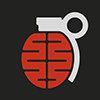Russian President Vladimir Putin made a surprise announcement this week during a televised appearance: The country s law enforcement bodies would be overhauled, and a new National Guard agency would be created. The new unit would be tasked with fighting terrorism, taking down organized crime, and suppressing mass disturbances leading to speculation that the new National Guard would be used to quell protests in the Russian streets.
The new law enforcement agency may already be getting ready for such a scenario. A video released Friday shows National Guard units shooting stun grenades, firing rounds, and using crowd control techniques against mock protests on the outskirts of Moscow.
The video was released by Open Russia, a civil society group founded by Russian dissident and former oil tycoon Mikhail Khodorkovsky, and it shows a large-scale training exercise simulating a popular protest in the streets of a major city. The protesters carry flags and chant slogans as National Guard units in riot gear fire water cannons and divert the protesters as they march. According to Open Russia, the footage was taken by one of its staff in the town of Lyubertsy, about 13 miles from Moscow, and shows a secret training exercise for the National Guard in what the group calls a Moscow Maidan, referencing the protests in Ukraine that ousted former President Viktor Yanukovych in 2014.
The new National Guard has grabbed headlines across Russia and the world due to the sweeping powers it may be given, including the right to shoot or use force without warning and detain people on sight. The bill establishing the National Guard still needs to be signed by the State Duma, the Russian legislature, but the law enforcement shake-up is expected to be embraced warmly by lawmakers. Once approved, the agency could number up to 400,000 people and have access to tanks, heavy artillery, and even attack helicopters.
Viktor Zolotov, the former chief of the president s security service and Putin s former judo sparring partner, will be the head of the National Guard. Its units will be reshuffled from Interior Ministry troops and will report directly to Putin, according to his spokesman, Dmitry Peskov.
Putin s popularity remains high and has not dipped below 80 percent since Russia s annexation of Crimea in 2014. But slow growth, coupled with falling oil prices and Western economic sanctions, have hurt the Russian economy and seen living standards drop sharply. Parliamentary elections are slated for September and are seen as the first test on the Kremlin s control of political life since the country s dire economic outlook took effect.
The last time Russians took to the streets en masse was after the 2011 parliamentary elections when thousands of demonstrators in Moscow and other cities protested allegations of ballot-rigging and electoral fraud. The emergence of the National Guard and the approaching parliamentary elections in September were not lost on the prominent Russian newspaper Vedomosti, which remarked in an editorial that the new law enforcement agency was meant to keep Russians under control:
The appearance of a superpower agency can be considered as the official recognition of the significance of a new threat the threat of the internal enemy, the newspaper said.
